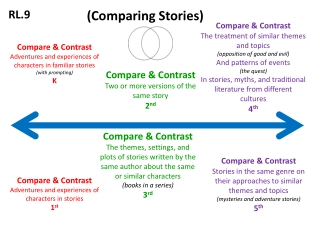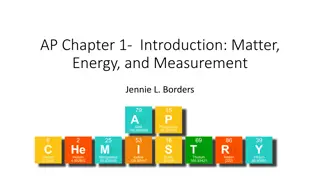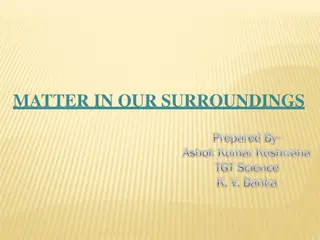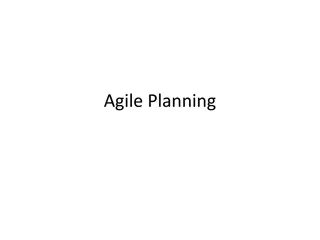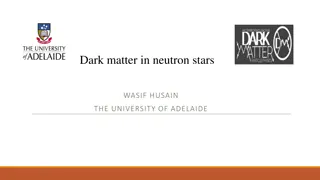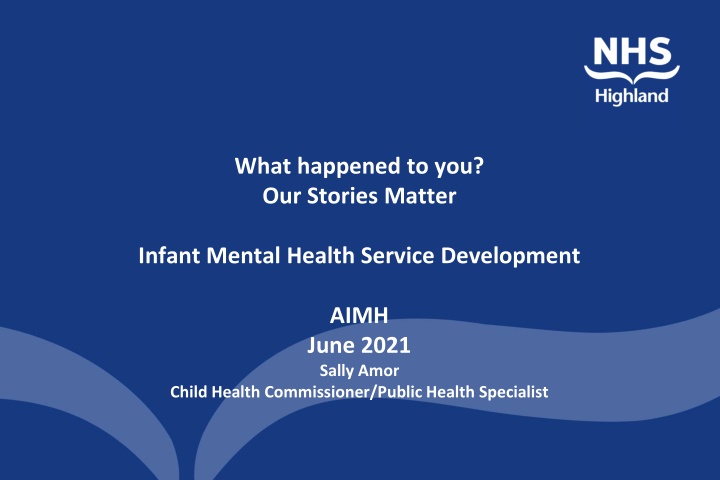
Infant Mental Health Service Development: Our Stories Matter
"Explore the critical importance of infant mental health in the development of children during the first 1001 days of life. Learn about the key factors influencing mental health, relationships, and support systems for families. Discover the comprehensive approach towards preventive, primary, secondary, and tertiary mental health services for infants and caregivers."
Download Presentation

Please find below an Image/Link to download the presentation.
The content on the website is provided AS IS for your information and personal use only. It may not be sold, licensed, or shared on other websites without obtaining consent from the author. If you encounter any issues during the download, it is possible that the publisher has removed the file from their server.
You are allowed to download the files provided on this website for personal or commercial use, subject to the condition that they are used lawfully. All files are the property of their respective owners.
The content on the website is provided AS IS for your information and personal use only. It may not be sold, licensed, or shared on other websites without obtaining consent from the author.
E N D
Presentation Transcript
What happened to you? Our Stories Matter Infant Mental Health Service Development AIMH June 2021 Sally Amor Child Health Commissioner/Public Health Specialist
What happened to you? Our stories matter Image result for infant mental health rare jewels report graphic The first 1001 days of life, from conception to age 2, is a time of unique opportunity and vulnerability It is a period of particularly rapid growth, when the foundations for later development are laid. During this time, babies brains are shaped by the interactions they have with their parents/primary carers. During this period, babies are unable to talk about their feelings and needs They are completely dependent on adults to survive.
What happened to you? Our stories matter o A relationship led approach o Systemic thinking o Rights led o Trauma informed and responsive
Programme for Government Perinatal Infant Mental Health Programme Board Midwives Primary care (GPs/wider team Health visitors Early Education /Child Care/AHPs Primary Mental Health Workers/Edi Psychology National Planning Scotland/UK Universal Services Secondary Care Services Tertiary Services Family Nurse Partnership Homestart Obstetric Services Special Care Baby Unit Infant Mental Health Team Perinatal Mental Health Team Drug/alcohol teams Mother and Baby Units Neonatal Intensive Care Units Outreach Services Child protection
A Preventive Approach Physical and Mental Health Parent/carer infant/toddler interactions Play/exercise/sleep Parental relationships/mental health/alcohol/drugs Breast feeding/nutrition/weaning Building individual/family capabilities and capacity Income maximisation/Healthy Start Vitamins Getting by ~80% High quality universal services (Primary prevention) Antenatal care planning Child Plan processes Identifying Assessing Intervening Reviewing needs Strengths and difficulties Clinical needs and risks: additional vulnerabilities disabilities/lifestyle Getting help ~15% Additional relationship/care needs (Secondary Prevention) Specialist health care Balancing infants clinical needs with nurture and attachment needs Supporting clinical teams Nursing, AHPs Medical Support staff Supporting parents and parent infant relationships Where care experience and or permanency are being considered/enacted Getting more help ~2-4% (Tertiary Prevention) Timely identification of risk and need re mental needs of mother impacting on attachment relationship Problematic drug and alcohol use with impact on infant wellbeing and safety Acute presentations Out of hours/acute risk ~1%
Almost 7 in 10 found their ability to cope with their pregnancy or baby had been impacted as a result of COVID-19. Nearly 7 in 10 felt the changes brought about by COVID-19 were affecting their unborn baby, baby or young child. Only one third expressed confidence in being able to access mental health support if required. Almost half (47%) of parents reported their baby had been more clingy. One quarter (26%) reported there baby crying more than usual https://www.bestbeginnings.org.uk/news/the-babies-in- lockdown-report
Story informed - Infants/toddlers Data/performance driven - Parents/carers - Clinicians - Pathways - Wider teams - Balanced score card Knowledge led - Communities - Audit - Research - Clinical Standards - Practice - Professional standards
Next steps - Appoint to Project Manager/Improvement Lead - Recruit to specialist posts/teams - Listen with/to women/partners through HomeStart and Highland Maternity Voices - Develop and test link worker role for midwifery, health visitor and community mental health teams - Develop pathways into services and support - Scope training/education/data and audit needs and opportunities

